Swollen feet after hiking is a common problem that many hikers experience. It can be caused by various factors, such as overuse of foot muscles, peripheral edema, or medical conditions like heart failure or kidney disease. Symptoms of swollen feet after hiking include pain, numbness, tingling, and swelling in the feet and toes.
If you have swollen feet after hiking, there are several treatment options available, such as resting, elevating your feet, and applying ice packs. Additionally, wearing comfortable and supportive footwear, staying hydrated, and taking breaks during your hike can help prevent swollen feet. However, if the swelling is severe or does not improve with rest, it is important to see a doctor.
In this article, I will discuss the symptoms, treatment, and prevention of swollen feet after hiking, as well as some medical conditions that can cause this problem. I will also answer some frequently asked questions about swollen feet after hiking. By the end of this article, you will have a better understanding of how to prevent and treat swollen feet after hiking.
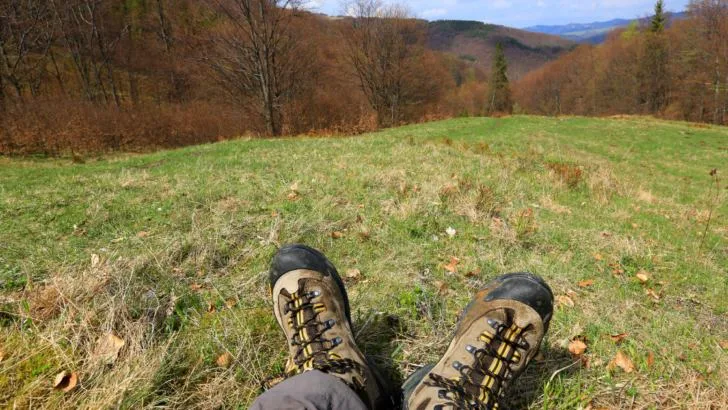
Key Takeaways
- Swollen feet after hiking is a common problem caused by overuse of foot muscles, peripheral edema, or medical conditions like heart failure or kidney disease, and for some hiking can cause hemmorhoids.
- Treatment options include resting, elevating your feet, and applying ice packs, while prevention measures include wearing comfortable and supportive footwear, staying hydrated, and taking breaks during your hike.
- If the swelling is severe or does not improve with rest, it is important to see a doctor.
Symptoms of Swollen Feet After Hiking
After a long hike, it is not uncommon to experience swollen feet and ankles. This can be a result of various factors, including overuse, dehydration, or underlying medical conditions. Here are some common symptoms of swollen feet after hiking:
- Swelling in the feet, ankles, and legs
- Tightness or discomfort in the affected area
- Redness or warmth in the swollen area
- Difficulty moving the affected area
- Numbness or tingling sensation
- Pain or tenderness when touched
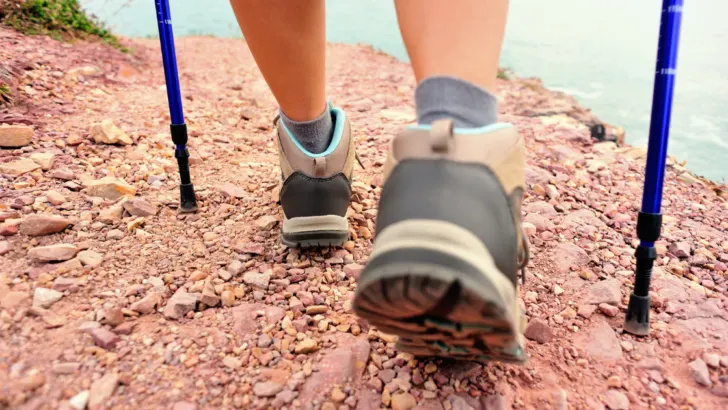
If you experience any of these symptoms after hiking, it is essential to take proper measures to address the issue. Ignoring the symptoms can lead to further complications, such as nerve damage or blood clots.
It is important to note that swelling in the feet after hiking is a common occurrence and usually goes away on its own after a few hours of rest. However, if the swelling persists or worsens, it may be a sign of an underlying medical condition, and you should seek medical attention.
In the next section, we will discuss the causes of swollen feet after hiking and how to prevent and treat them.
Treatment for Swollen Feet After Hiking
After a long day of hiking, it is common for your feet to swell. This can cause discomfort and pain, making it difficult to walk or continue with your hiking plans. Fortunately, there are several treatment options available to help alleviate the swelling and pain.
First, it is important to rest and elevate your feet. Find a comfortable spot to sit or lie down and prop your feet up on a pillow or cushion. This will help to reduce swelling and improve circulation.
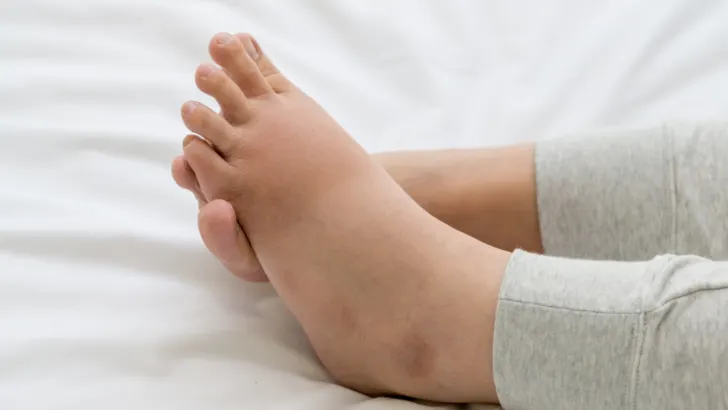
Next, you can try applying a cold compress to your feet. This can be a bag of ice, a cold towel, or a frozen water bottle. Wrap the compress in a towel or cloth and apply it to your feet for about 15-20 minutes. This will help to reduce inflammation and numb the pain.
If the swelling and pain persist, you may want to consider taking an over-the-counter anti-inflammatory medication such as ibuprofen. This can help to reduce swelling and alleviate pain.
In addition to these treatments, it is important to stay hydrated and avoid alcohol and caffeine, which can dehydrate your body and exacerbate swelling. Make sure to wear comfortable, well-fitting shoes and socks that provide adequate support and cushioning.
By following these treatment options, you can help to alleviate swelling and pain in your feet after a long day of hiking. Remember to listen to your body and take breaks as needed to avoid further injury or discomfort.
Prevention of Swollen Feet After Hiking
As someone who loves hiking, I know how uncomfortable swollen feet can be after a long day on the trail. Fortunately, there are several steps you can take to prevent your feet from swelling and reduce the risk of injury.
First and foremost, make sure you wear the right footwear. Your hiking boots should fit well and provide adequate support for your feet and ankles. If your boots are too tight or too loose, you may experience swelling or blisters. Check out my related posts on how to find the perfect fit and how to stretch hiking boots for more information.
Another way to prevent swollen feet is to take frequent breaks and elevate your feet. If you’re hiking for an extended period, try to take a break every hour or so to rest your feet and stretch your legs. You can also elevate your feet above your heart to improve circulation and reduce swelling.
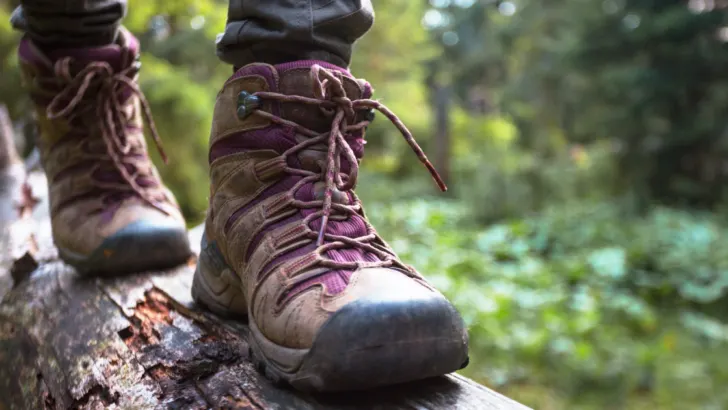
Staying hydrated is also essential. Dehydration can cause your feet to swell, so make sure you drink plenty of water before, during, and after your hike. Avoid alcohol and caffeine, which can dehydrate you.
Lastly, consider wearing compression socks or sleeves. These can help improve circulation and reduce swelling by compressing your feet and legs. Make sure you choose the right size and compression level for your needs.
By taking these steps, you can prevent swollen feet and enjoy your hiking adventures to the fullest.
Related Posts:
- Do Hiking Boots Stretch? A Guide to Finding the Perfect Fit
- How to Stretch Hiking Boots for a Powerful Ideal Fit
If You Have Swollen Feet After Hiking, You Should See a Doctor If the Swelling is Severe or Does Not Improve with Rest
If you notice that your feet are severely swollen after hiking, or if the swelling does not improve with rest, you should consider seeing a doctor. This is especially important if you have a history of heart, liver, or kidney disease, or if you are pregnant.
Swollen feet can be a sign of a serious health condition, such as preeclampsia or heart failure. If you are pregnant and experiencing swollen feet, it is important to see a doctor to rule out any underlying health problems.
In addition, if you have a history of heart, liver, or kidney disease, you may be at an increased risk for swollen feet after hiking. These conditions can affect the body’s ability to regulate fluid levels, leading to fluid buildup in the feet and ankles.

If you are experiencing severe or persistent swelling in your feet after hiking, your doctor may recommend certain tests to determine the underlying cause. These tests may include blood tests, imaging tests, or a physical examination.
In some cases, your doctor may recommend lifestyle changes or medications to help manage your symptoms. For example, if you have heart failure, your doctor may recommend diuretics to help reduce fluid buildup in the body.
Overall, if you are experiencing swollen feet after hiking, it is important to take steps to manage your symptoms and prevent further complications. This may involve seeing a doctor, making lifestyle changes, or taking medications as directed.
There Are Some Medical Conditions That Can Cause Swollen Feet, Such as Heart Failure and Kidney Disease
Swollen feet can be caused by a variety of factors, including medical conditions. If you have swollen feet after hiking, it’s important to consider whether an underlying medical condition could be the cause.
Heart failure is one such medical condition that can cause swollen feet. When the heart is unable to pump enough blood throughout the body, fluid can accumulate in the legs and feet. This is known as edema and can cause swelling, discomfort, and pain. Other symptoms of heart failure may include shortness of breath, fatigue, and a rapid or irregular heartbeat.

Kidney disease is another medical condition that can cause swollen feet. When the kidneys are not functioning properly, excess fluid can build up in the body, leading to edema. Other symptoms of kidney disease may include fatigue, nausea, and changes in urination.
If you have swollen feet after hiking and suspect that an underlying medical condition may be the cause, it is important to speak with your healthcare provider. They can perform a physical exam, review your medical history, and order any necessary tests to determine the cause of your swelling.
In addition to heart failure and kidney disease, there are other medical conditions that can cause swollen feet, such as liver disease, venous insufficiency, and lymphedema. If you experience persistent swelling in your feet or other symptoms, it is important to seek medical attention to determine the underlying cause and receive appropriate treatment.
If You Are Prone to Swollen Feet, You May Want to Consider Wearing Compression Socks on a Regular Basis
I have found that wearing compression socks on a regular basis can be helpful in preventing swollen feet, especially after hiking. Compression socks work by applying pressure to the legs, which helps to improve blood flow and prevent fluid buildup in the tissues.
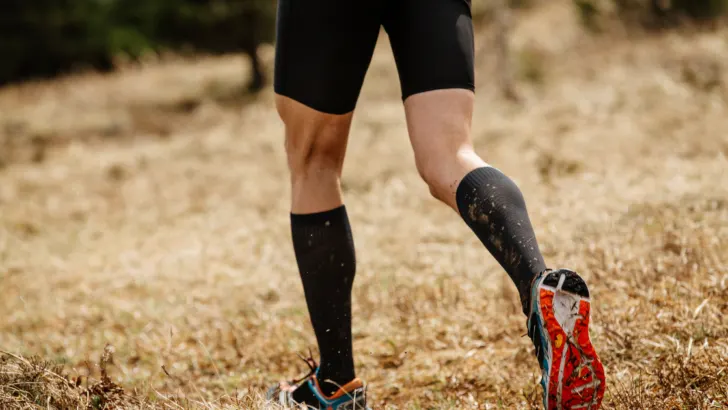
There are many different types of compression socks available, and it can be overwhelming to choose the right one. It is important to find a pair that fits well and provides the right amount of compression for your needs. Some factors to consider when choosing compression socks include:
- Level of compression: Compression socks come in different levels of compression, ranging from mild to extra firm. The level of compression you need will depend on your individual needs and the severity of your swelling.
- Material: Compression socks can be made from a variety of materials, including nylon, spandex, and cotton. Look for socks that are made from breathable materials that will keep your feet cool and dry.
- Length: Compression socks come in different lengths, including knee-high, thigh-high, and ankle-length. Choose a length that is comfortable for you and provides the right amount of compression for your needs.
In addition to wearing compression socks, there are other steps you can take to prevent swollen feet after hiking. These include:
- Staying hydrated: Drinking plenty of water can help to prevent dehydration, which can contribute to swelling.
- Resting and elevating your feet: Taking breaks to rest and elevate your feet can help to reduce swelling and improve circulation.
- Stretching: Doing simple stretches, such as ankle circles and calf raises, can help to improve circulation and prevent swelling.
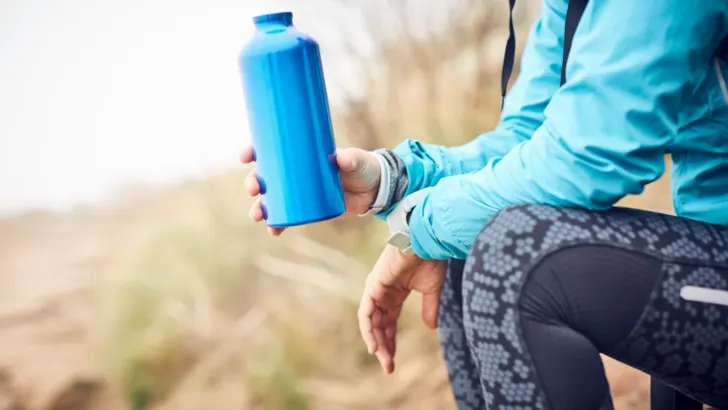
Overall, if you are prone to swollen feet, wearing compression socks on a regular basis can be a helpful preventative measure. By choosing the right pair of socks and taking other steps to prevent swelling, you can enjoy hiking without experiencing discomfort or pain in your feet.
Conclusion
Based on my research and personal experience, swollen feet after hiking is a common issue that can be caused by various factors such as peripheral edema, heavy load on feet and ankles, vascular issues, bone or tendon problems, and increased blood flow.
To prevent swollen feet, it is important to wear well-fitted hiking shoes and socks, limit moisture, and bring blister protection. It is also recommended to check your pack weight and take breaks to rest your feet.
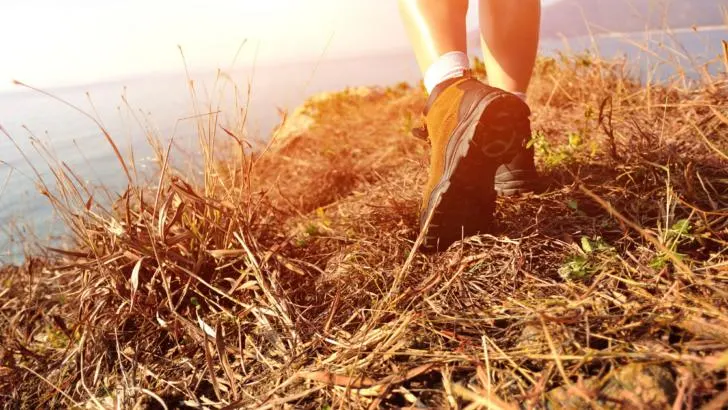
If you do experience swollen feet after hiking, there are several remedies you can try such as elevating your feet, taking a cool bath or shower, massaging your feet, and using compression socks. It is important to listen to your body and seek medical attention if the swelling persists or is accompanied by pain or other symptoms.
Remember, prevention is key when it comes to swollen feet after hiking. By taking the necessary precautions and being mindful of your body, you can enjoy a comfortable and safe hiking experience.
Resources
- American Hiking Society: https://americanhiking.org/
- The American Heart Association: https://www.heart.org/
- Mayo Clinic: https://www.mayoclinic.org/
- Healthline: https://www.healthline.com/
- Verywell Fit: https://www.verywellfit.com/
- REI Co-op: https://www.rei.com/
Frequently Asked Questions
How can I prevent swollen feet after hiking?
To prevent swollen feet after hiking, it is important to wear comfortable and properly fitting shoes or boots. Make sure to wear socks that wick away moisture and avoid tight socks or boots. Take breaks during your hike to rest and elevate your feet. Staying hydrated and maintaining a healthy diet can also help prevent swelling.
What are some remedies for swollen feet after hiking?
Resting and elevating your feet can help reduce swelling. Applying ice or a cold compress can also help reduce inflammation. Massaging your feet and using compression socks or wraps can improve circulation and reduce swelling. Over-the-counter pain relievers can help alleviate discomfort.
What causes swollen feet after hiking?
Swollen feet after hiking can be caused by a variety of factors, including exertion of force, tight socks or boots, and enlarged blood vessels. Fluid can escape into the tissue during physical activity, leading to swelling.
Is it normal for feet to swell after hiking?
Yes, it is normal for feet to swell after hiking, especially if you are exerting yourself or hiking for an extended period of time. However, if the swelling is severe or accompanied by other symptoms, it may be a sign of a more serious condition and should be evaluated by a healthcare professional.
Are swollen feet after hiking dangerous?
In most cases, swollen feet after hiking are not dangerous and can be treated with rest and home remedies. However, if the swelling is severe or accompanied by other symptoms such as pain, redness, or warmth, it may be a sign of a more serious condition such as a blood clot or infection, and should be evaluated by a healthcare professional.
What are some ways to alleviate pain in the feet after hiking?
Resting and elevating your feet can help alleviate pain. Applying ice or a cold compress can also help reduce inflammation and pain. Over-the-counter pain relievers can help alleviate discomfort. Stretching and massaging your feet can also help alleviate pain and improve circulation.
